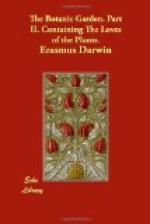[Cuscuta. l. 327. Dodder. Four males, two females. This parasite plant (the seed splitting without cotyledons), protrudes a spiral body, and not endeavouring to root itself in the earth ascends the vegetables in its vicinity, spirally W.S.E. or contrary to the movement of the sun; and absorbs its nourishment by vessels apparently inserted into its supporters. It bears no leaves, except here and there a scale, very small, membranous, and close under the branch. Lin. Spec. Plant. edit. a Reichard. Vol. I. p. 352. The Rev. T. Martyn, in his elegant letters on botany, adds, that, not content with support, where it lays hold, there it draws its nourishment; and at length, in gratitude for all this, strangles its entertainer. Let. xv. A contest for air and light obtains throughout the whole vegetable world; shrubs rise above herbs; and, by precluding the air and light from them, injure or destroy them; trees suffocate or incommode shrubs; the parasite climbing plants, as Ivy, Clematis, incommode the taller trees; and other parasites, which exist without having roots on the ground, as Misletoe, Tillandsia, Epidendrum, and the mosses and funguses, incommode them all.
Some of the plants with voluble stems ascend other plants spirally east-south-west, as Humulus, Hop, Lonicera, Honey-suckle, Tamus, black Bryony, Helxine. Others turn their spiral stems west-south-east, as Convolvulus, Corn-bind, Phaseolus, Kidney-bean, Basella, Cynanche, Euphorbia, Eupatorium. The proximate or final causes of this difference have not been investigated. Other plants are furnished with tendrils for the purpose of climbing: if the tendril meets with nothing to lay hold of in its first revolution, it makes another revolution; and so on till it wraps itself quite up like a cork-screw; hence, to a careless observer, it appears to move gradually backwards and forwards, being seen sometimes pointing eastward and sometimes westward. One of the Indian grasses, Panicum arborescens, whose stem is no thicker than a goose-quill, rises as high as the tallest trees in this contest for light and air. Spec. Plant a Reichard, Vol. I. p. 161. The tops of many climbing plants are tender from their quick growth; and, when deprived of their acrimony by boiling, are an agreeable article of food. The Hop-tops are in common use. I have eaten the tops of white Bryony, Bryonia alba, and found them nearly as grateful as Asparagus, and think this plant might be profitably cultivated as an early garden-vegetable. The Tamus (called black Bryony), was less agreeable to the taste when boiled. See Galanthus.]
In
the meek garb of modest worth disguised,
330 The eye averted, and the smile chastised,
With
sly approach they spread their dangerous charms,
And
round their victim wind their wiry arms.
So
by Scamander when LAOCOON stood,
Where
Troy’s proud turrets glitter’d in the flood,
335 Raised high his arm, and with prophetic call
To
shrinking realms announced her fatal fall;
Whirl’d
his fierce spear with more than mortal force,
And
pierced the thick ribs of the echoing horse;




